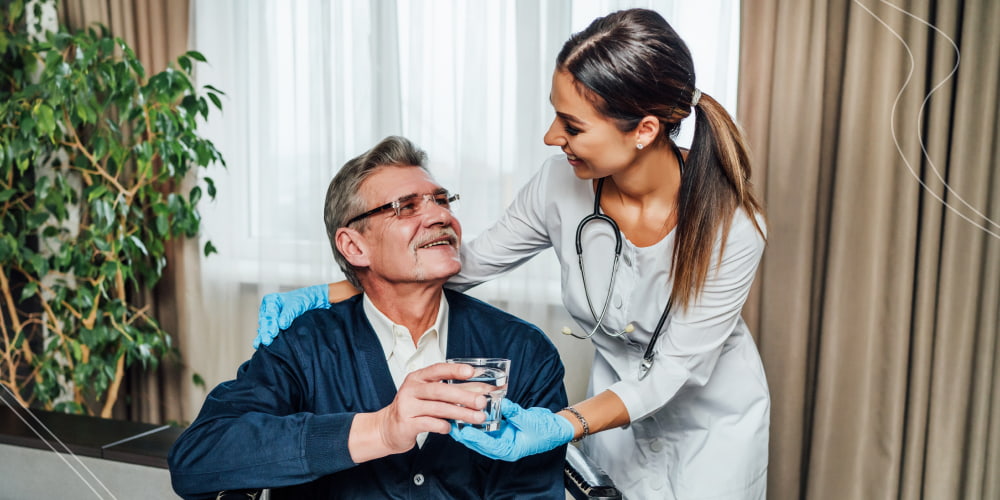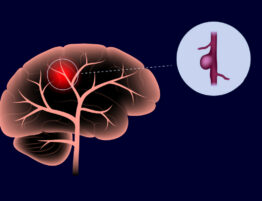Dementia is a disease in which the cognitive (ability to think) abilities of the patient are impaired. Dementia causes a gradual deterioration in memory, mental abilities, the ability to navigate in time and space, and the ability to recognize people and objects. It happens that dementia turns into Alzheimer’s disease.
Alzheimer’s disease is the most common type of dementia, a condition in which the brain stops functioning properly. Alzheimer’s disease causes problems with memory, thinking, and behavior. In the early stages, the symptoms of dementia may be minimal. But as the disease affects the brain more and more, the symptoms worsen, and cognitive decline occurs. The rate at which the disease progresses varies from person to person, but the average life expectancy after diagnosis is eight years.
Globally, at least 44 million people live with dementia, making it a global problem that needs attention. A diagnosis of Alzheimer’s disease dramatically changes the person’s life and his family and friends. However, information and support are available to everyone. Nobody should deal with Alzheimer’s and dementia one-on-one.
While there is currently no cure that can stop the progression of Alzheimer’s and dementia disease, there are medications that can alleviate the symptoms. Over the past three decades, dementia research has led to a deeper understanding of how Alzheimer’s disease affects the brain. Today, researchers continue to look for more effective treatments and measures to prevent Alzheimer’s disease and improve brain health.
Symptoms of Alzheimer’s Disease and Dementia
Memory problems, particularly difficulty remembering newly learned information, are often the first signs of Alzheimer’s.
As we age, changes occur in our brains, and sometimes it can be difficult to remember certain details. However, Alzheimer’s and dementia disease causes memory loss and other serious symptoms that interfere with the normal performance of daily functions. These symptoms are not natural to normal age-related changes.
In addition to memory loss, symptoms of Alzheimer’s disease include:
- Problems with completing tasks that were not difficult before.
- Difficulty solving problems.
- Changes in mood and character, distance from family and friends.
- Problems with verbal and written communication.
- Problems with recognizing places, people, restoring the sequence of events.
- Changes in visual perception, such as difficulty interpreting an image.
Family and friends may notice the symptoms of Alzheimer’s and dementia earlier than the person experiencing such changes. If you or someone you know is experiencing possible symptoms of dementia, it is essential to get a medical examination to determine the cause.
Alzheimer’s disease and the brain
Brain cells in the hippocampus, the brain’s memory region, are often the first to be affected in Alzheimer’s disease. Therefore, memory loss, especially difficulty remembering recently learned information, and cognitive decline are usually the first signs of illness.
Diagnostics of Alzheimer’s and Dementia
It is necessary to see a doctor as soon as possible to prolong the expectancy of a patient with dementia. In case of memory and mental impairment of usually well-performed skills, it is recommended that you first consult your family doctor. If possible, the patient needs to come to the doctor with a human who will help describe the changes as an outside observer; this will help confirm the diagnosis. The patient himself may underestimate some of the problems or forget to share them with the doctor. The doctor may ask a human to fill out a questionnaire about the patient’s behavior and daily activity over the past six months.
Tell your family doctor:
- What is the main problem due to which you go to the doctor?
- How long does it take for these problems to appear?
- What was the first sign that something was wrong?
- How has human behavior changed?
- How much does he need outside help in everyday life?
- Does he have mood swings, thoughts of suicide, joy, aggressive behavior?
- Are there any comorbidities, and what medications, including dietary supplements, are they taking?
- How and at what age did family members develop dementia?
The family doctor evaluates the memory disorder with the Mini-Mental State Examination.
- The test assesses the ability to navigate in space and time, attention and memory, and the ability to plan the activities necessary for the task.
- The maximum number of points in the test is 30; a result of 24 or less will indicate dementia. To analyze the results, the doctor considers the patient’s educational level, knowledge of languages, and other possible factors affecting the level of task completion.
The test can determine the severity of dementia: mild, moderate orsevere.
Testing Alzheimer’s and Dementia
The test also does not provide information about the causes of memory impairment. This will require additional surveys.
With the help of a blood test, you can investigate any other diseases, such as:
- low thyroid function;
- anemia;
- vitamin deficiencies;
- infectious diseases (for example, borreliosis, syphilis, AIDS);,
- cause of memory problems;
- low thyroid function;
- anemia;
- vitamin deficiency, etc.
With proper treatment of the above diseases, memory impairment can back down to one degree or another.
If necessary, the family doctor will refer the patient to a specialist in memory impairment (neurologist, psychiatrist, geriatrician).
- A patient with suspected Alzheimer’s and dementia disease undergoes a general head examination (computed tomography or magnetic resonance imaging) to rule out other brain diseases (e.g., brain tumor, chronic hemorrhage, hydrocephalus).
- If the diagnosis remains unclear, the doctor may refer the patient for a neuropsychological evaluation by a clinical psychologist. Tests carried out during the examination will help determine exactly which type of memory impairment is present in the patient. A neuropsychological evaluation is only good for patients with mild dementia syndrome and early-onset patients. For patients in advanced stages of the disease, the tests can be overwhelming.
- Treatment for Alzheimer’s and dementia slows down its development. The sooner the disease is detected, and treatment is started, the longer the patient’s ability to cope with daily activities remains. This allows humans and caregivers more time to adapt to the changing lifestyle and think through the essential issues that inevitably arise at the end of life.
Alzheimer’s disease progresses slowly. The late stage of the disease is formed over an average of five to ten years. This condition is considered an end-of-life stage that cannot be cured, and life prolongation by various medical procedures is not considered ethically acceptable.
Alzheimer’s and Dementia Risk Factors
While doctors still don’t know why some people get Alzheimer’s and others don’t, research has helped better understand what factors make a person more vulnerable to the disease.
| Age | Old age is a major risk factor for developing Alzheimer’s disease. Most people with this disease are at least 65 years of age.
Although much less common, this disease can begin before the age of 65. It is estimated that the number of such patients is up to 5%. Often, manifestations of dementia at a younger age are misdiagnosed. |
| Heredity | If any of your parents or siblings suffer from dementia, you are more likely to get the disease than those who do not have such immediate family members. Scientists do not fully understand the causes of familial cases of Alzheimer’s, but genetic, environmental, and lifestyle factors may play a role. |
| Genetic factor | Scientists have identified several genes whose mutations increase the risk of developing dementia. The APOE e4 of the is the most common gene for the risk of Alzheimer’s disease; it is estimated that it played a role in developing the disease in about a quarter of cases.
Unlike the risk gene, the determinant gene guarantees the development of the disease. There was only one known case when Alzheimer’s disease arose due to the inheritance of a determinant gene. The development of dementia due to a determining gene rarely occurs in less than 1% of cases. Alzheimer’s disease, caused by a determinant gene, is called autosomal dominant Alzheimer’s disease. |
| Moderate cognitive impairment | Symptoms of cognitive decline include changes in thought processes, but they do not interfere with daily functions and are not as severe as in Alzheimer’s or other progressive dementia. Having mild cognitive impairments, especially those associated with memory problems, increases the risk of developing Alzheimer’s disease and other dementias. However, mild cognitive impairment does not always progress. In some cases, they are reversible or remain at the same level. |
| Cardiovascular diseases | Research suggests that brain health is directly related to cardiovascular health. The brain receives oxygen and nutrients necessary for normal functioning through the blood, and the heart is responsible for the flow of blood to the brain. Therefore, the causes that lead to cardiovascular disease may be related to an increased risk of Alzheimer’s disease. These include smoking, being overweight, diabetes, high cholesterol, and high blood pressure in middle age. |
| Education level and Alzheimer’s disease | Research has established a link between fewer years of formal education and an increased risk of dementia. While there is no obvious reason for this dependence, some scientists suggest that more years of formal education may help strengthen the connection between neurons, allowing the brain to use alternative neuron-to-neuron signaling pathways for the changes caused by Alzheimer’s and other dementias. |
| Traumatic brain injury | The risk of Alzheimer’s and other dementias is increased due to moderate to severe head injuries, such as blows to the head or other skull injuries that result in loss of memory or consciousness for more than 30 minutes. Road traffic accidents cause 50% of all head injuries. Those constantly hit in the head and other traumatic brain injuries, such as athletes or combatants, are also at increased risk of developing dementia and cognitive impairment. |
Ways to Prevent Alzheimer’s and Dementia
Dementia is often called a worldwide catastrophe, which is just waiting in the wings and the main medical problem of the current generation.
Every four seconds, someone on Earth is diagnosed with dementia, and the number of sufferers is expected to skyrocket from 44 million to 135 million by 2050. The disease costs the world $ 604 billion every year. In order to prevent it, you need to undergo:
- Early diagnosis.
- Early diagnosis will be the key to fighting Alzheimer’s and dementia. When a doctor informs a patient that they have dementia, the patient may feel that the disease is very early. This is not necessarily the case. Memory problems begin to appear only 10-15 years after the onset of the disease. By this time, a fifth of the key memory centers in the brain are usually already dead.
- This explains why drugs, in most cases, are ineffective; the disease is diagnosed too late. Neurologists believe that the priority is to focus on the early stage of treatment. Some results have already been achieved in this area. However, the most difficult moment is using the results obtained to combat the development of Alzheimer’s and dementia.
- A study is also being conducted to determine the composition of chemicals in the blood that indicate the onset of the disease. Dementia is a variety of diseases. Alzheimer’s disease, vascular dementia, and Lewy body dementia (abnormal protein formations are called) have similar symptoms but different treatments. Thus, scientists will need to apply different technologies for each type of disease.
- Stop brain dying.
- Until a drug was invented, that could stop or even slow down dementia. Two types of Alzheimer’s drugs have failed to deliver the expected results in improving brain function. However, some think that medications that work in the early stages of the disease will work better. Therefore, new trials are aimed at monitoring patients with a mild form of senile dementia.
- If the drug proves to be effective, it will be used the same way that statins are used today for the heart. Healing dementia seems like a distant dream, but even slowing the progression of the disease can fundamentally change the patient’s life expectancy.
How to Treat Alzheimer’s Disease and Dementia?
One of the drugs that slow the progression of dementia is memantine. It was developed and approved for use in the United States in 2003. Since then, nothing new has been developed. There are certainly other drugs that help people live with dementia, but they are not enough. It is necessary to develop drugs that would treat symptoms and slow the progression of the disease in the same way as it is done after a heart attack.
- To reduce your risk of lung cancer, you must first quit smoking. You need to lead an active lifestyle and eat right to avoid a heart attack. What should be done to avoid getting sick with Alzheimer’s and dementia? Alas, there is no answer to this question.
- Age is undoubtedly a risk factor. In Britain, one in three people aged 95 and over suffers from dementia, but no one knows how to help these people.
It is essential to monitor your heart to reduce damage to your blood vessels. Therefore, avoid obesity, do not smoke, exercise regularly, and monitor your cholesterol, blood sugar, and blood pressure levels.
Quality patient care. Alzheimer’s and dementia are incredibly costly to society. But medical bills are only a small part of the damage because it is necessary to consider the time the patient’s relatives spend caring for the patient and the associated loss of earnings.
Therefore, part of the research aims to develop an approach that would allow patients to remain independent as long as possible. The study of the disease has shown that with the correct training of medical personnel, patient intake can be halved. In order to improve the living conditions of people with senile dementia, it is essential to seriously research patient care and support.
FAQ
- What is the average life expectancy for people with Alzheimer’s?
Life expectancy for each person with Alzheimer’s varies. In general, the average life expectancy after diagnosis is 8 to 10 years; however, it can be from 3 to 20 years in some cases. In addition, Alzheimer’s disease can go undetected for several years. The average time between the onset of symptoms and diagnosis is 2.8 years.
- Where does Alzheimer’s disease come from?
The cause of Alzheimer’s disease can be a low level of substances involved in the transmission of nerve impulses, various brain tumors, poisoning with poisonous metals. The main cause of Alzheimer’s disease is a genetic predisposition; it is inherited.
- Who is prone to Alzheimer’s disease?
As a rule, Dementia with Alzheimer’s disease is found in people over 65 years old, but there is also early Alzheimer’s disease – from 55 years old.
- What disease can cause symptoms of amnesia, difficulty performing simple tasks, speech disorders, lack of interest in life?
This can be the symptoms of Alzheimer’s disease. But in order to be sure of this, you should consult a doctor so that he makes an accurate diagnosis and conducts the necessary tests.













Please, leave your review
Write a comment: